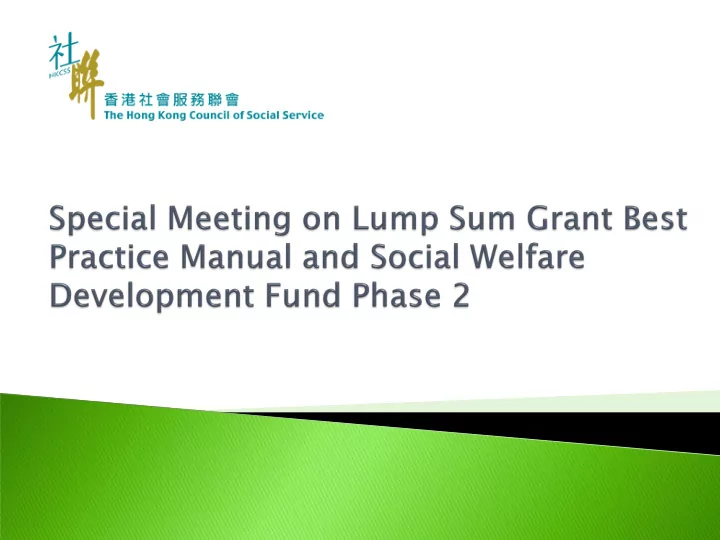

HKCSS Core Group (open group) Historical perspective (what happened in the last 12 months) Where we are up to
With high consensus on the identified strategies amongst stakeholders, no strong divergence or conflicting views; Strong guiding principles to support the practice; Adopting the practice by all NGOs would improve service quality, service efficiency, and/or long-term development of social service.
Should be developed within the Lump Sum Grant (LSG) framework and LSG spirit Should be clearly defined and enforceable, otherwise not implementable SWD should clarify the consequence of non- compliance
“…Under LSG, SWD will no longer impose input controls with regard to staffing structures, levels of pay and individual items of expenditure…. With the exception of a few designated expenditure items, NGOs may freely deploy the funds as long as the required objectives, outputs, results and standards are met.” LSG Manual October 2000: Preamble
2.14 ….. NGOs have flexibility in deploying their LSG (excluding the PF part) for purposes including, but not limited to, the following : (a) staff expenses including salary, allowances and personnel- related expenses (including fringe benefits) for their staff based on their own staffing structure and remuneration; and (b) other operating expenses. 2.15 ….. vire from one cost item to another cost item, e.g. from OC to salaries and vice versa. There is no need for NGOs to obtain approval from SWD …… comply with the principles as stated in paragraph 2.14 above. …..
All BPM items should only be applied to FSA related activities The contract between NGOs and SWD should be confined to the subvention context
Finance ◦ Use of Reserves (LSG+PF) as stipulated in manual – level 1 1.1.1 , 1.2.1 ◦ Optimum reserve level – level 2 1.1.2 ◦ Transparency of reserves (LSG+PF) – level1 1.1.3, 1.2.2
Human Resources Management ◦ Content of HR policies - all level 2 items ◦ 2.1.1, 2.1.2*, 2.2.1*,2.2.2 ◦ Establish HR policies and have it made known to staff – could be level 1 2.1.3
Governance ◦ All items should be level 2 3.1.1,3.1.2,3.1.3,3.2.1, 3.2.2 ◦ Accountability and Communication of Governance decision – Level 1 3.2.3 ◦ Role of governance in complaint handling – level 1
Active participation to the 3-4 consultation sessions for the sector from Dec11 to Jan28 Written submission of each NGO sent to SWD separately (a position paper for board’s reference will be provided) Engagement of Boards – arrange a meeting for board members to attend , to meet with DSW (to be discussed)
1. Should simplify and allow more flexibility in the application and vetting procedures. 2. Under Phase 1, Virement of funds from non- IT projects to IT projects, and virement of funds across IT projects are not allowed. It is proposed that such virement should be allowed. 3. Should provide administrative support in all projects
4.Claw Back Arrangement the surplus of funds by the end of Phase 1 will be clawed back unless prior approval for using the funds is obtained. That mechanism is unclear and needs clarification. 5. Subsidies for employing Relief Workers Providing subsidies for employing Relief Workers is a desirable arrangement, but NGOs found it difficult to make use of that measure to release staff members to attend training
Some discussions have occurred at Lump Sum Grant Steering Committee and Lotteries Fund Advisory Committee (LFAC)
1. What does ‘claw back’ means actually? Would that affect NGOs’ total entitlement of SWDF at the end? 2. Inclusion of non-subvented service staff in training programs when there is no additional cost implication… any strings attached? 3. Provision of administrative support in all projects … level of financial support and application procedures, any tricky steps?
4. Virement of funds among non-IT and IT projects … we heard that some kinds of consent from SWD have to be sought.. What are the steps involved and are they practical? 5. How specific should the training proposals be so that we can leave ample room for changes during implementation?
6 . Sharing of information What level of information would have to be shared across organizations and how? 7. Streamlining the process of applications for IT projects Should NGO wait until the new ICT Strategy is announced? How to calculate the 3-year period if NGOs would have to wait?
To be held in January 2013 Content: HKCSS’s Support in IT Projects, Research Projects and NGO training.
Recommend
More recommend